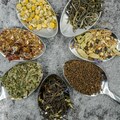
QUESTION, Constipation, 50 year old female: “My gastroenterologist has diagnosed me with chronic constipation. I have had this since last June. I don’t really believe in taking cupfuls after cupfuls of MiraLax. I’m thinking there’s gotta be a more holistic way to get my gut back on track. I believe it all started when I went on antidepressants a couple years ago. I am not on them anymore, but my gut has not healed properly. I have a colonoscopy scheduled for July. Right now I’m just drinking smooth tea, which really helps. But if I don’t drink it, I get constipated for days and days. Do you think you could help me? What are the steps?”
ANSWER: Yes, Chinese herbal therapy is very effective at treating constipation and getting your gut back on track! A proper evaluation is needed because there are several reasons (ie, diagnoses, or what we call "patterns") in Chinese herbal medicine as to why you may be constipated. Each diagnosis will have different herbal combinations. When you have a full consultation and evaluation, your herbalist will gather information not only about your digestion but your body overall, looking for complex clues as to which diagnosis/pattern is the root of your issues. Your herbalist will then formulate a personalized combination of herbs that best match your uniqueness, addressing symptoms and the body overall. This formula will often change over time because at each phase, a different combination of herbs are used, walking the body through a process to recuperate your natural digestive abilities.
There are 3 phases to most treatment plans in TCM (Traditional Chinese Medicine)
- Eliminate symptoms
- Bring back your body’s natural abilities
- Fortify/Maintain to ensure symptoms do not return once herbal therapy is stopped.
Chinese Diagnoses that May Cause Constipation and Common Herbal Approaches
Here are some of the most common Chinese diagnoses for Constipation according to Chinese medicine. Often people have combinations of these diagnoses, and an experienced herbalist can mix and match formulas and herbs based on their experience and knowledge to address the complexity of an individual. The power of Chinese herbalism is in its personalization, mixing and matching formulas and individual herbs to an individual as symptoms improve and change over time. In reality, herbal formulas are modified, meaning herbs are added and subtracted to any representative formula to address the individual’s presentation and uniqueness. Consultation and follow up with an experienced Chinese medical herbalist is key.
Spleen Qi Deficiency: In TCM, the spleen plays a crucial role in the digestion and absorption of nutrients. When the spleen Qi (vital energy) is deficient, it struggles to perform its functions effectively. This can lead to symptoms such as bloating, abdominal distension, fatigue, and, importantly, constipation. Without sufficient spleen Qi, the digestive system becomes sluggish, resulting in poorly formed stools and difficulty in passing them. Spleen Qi deficiency can be exacerbated by factors such as poor dietary habits, excessive worry or overthinking, and chronic illness.
Common Herbs: Ginseng (Ren Shen), Atractylodes (Bai Zhu), Codonopsis (Dang Shen), and Licorice (Gan Cao).
Representative Formula: Si Jun Zi Tang (Four Gentlemen Decoction). This formula contains ginseng, atractylodes, poria, and licorice, which work together to tonify the spleen Qi, strengthen digestion, and alleviate symptoms of bloating and fatigue.
Liver Qi Stagnation: The liver is responsible for the smooth flow of Qi (vital energy) throughout the body. When the liver Qi becomes stagnant, often due to emotional stress, frustration, or unresolved anger, it can disrupt the flow of Qi in the digestive system. This stagnation may manifest as abdominal discomfort, bloating, and constipation. In addition, liver Qi stagnation can also affect the function of the gallbladder, which is essential for the digestion of fats. As a result, individuals with liver Qi stagnation may experience difficulty digesting fatty foods, further contributing to constipation.
Common Herbs: Bupleurum (Chai Hu), Cyperus (Xiang Fu), Peony (Bai Shao), and Citrus Peel (Chen Pi).
Representative Formula: Xiao Yao San (Free and Easy Wanderer). This formula contains bupleurum, peony, cyperus, and other herbs that soothe the liver, regulate Qi, and relieve symptoms of abdominal discomfort and constipation associated with liver Qi stagnation.
Blood/Yin Deficiency: Blood and Yin (the nourishing, moistening aspect of the body) are essential for maintaining the health of the digestive system. When blood and Yin are deficient, the intestines may lack lubrication, leading to dry stools and difficulty in passing them. Additionally, blood and Yin deficiency can weaken the digestive organs, resulting in symptoms such as poor appetite, abdominal discomfort, and constipation. This pattern is often seen in individuals who have experienced prolonged illness, pregnancy, excessive stress, or overwork.
Common Herbs: Rehmannia (Shu Di Huang), Dong Quai (Dang Gui), White Peony (Bai Shao), and Schisandra (Wu Wei Zi).
Representative Formula: Ba Zhen Tang (Eight Treasure Decoction). This formula combines herbs such as rehmannia, dong quai, and white peony to nourish the blood and Yin, strengthen the body, and alleviate symptoms of dry stools and constipation associated with blood and Yin deficiency.
Yang Deficiency: Yang represents the warming, active, and transformative aspect of the body in TCM. Yang deficiency occurs when there is a lack of warmth and energy to fuel the body's metabolic processes. In terms of digestive health, yang deficiency can lead to a sluggish metabolism and poor digestive function. This may manifest as bloating, abdominal coldness, and difficulty in moving stools through the intestines, resulting in constipation. Yang deficiency is often associated with symptoms such as fatigue, feeling cold, and a pale complexion.
Common Herbs: Cinnamon Bark (Rou Gui), Aconite (Fu Zi), Prepared Aconite (Zhi Fu Zi), and Eucommia Bark (Du Zhong).
Representative Formula: You Gui Wan (Right Restore Pill). This formula contains warming herbs such as cinnamon bark, aconite, and prepared aconite, which tonify the kidney Yang, warm the body, and promote bowel movements in cases of constipation due to Yang deficiency.
Each of these TCM diagnoses reflects a specific pattern of imbalance within the body, impacting various aspects of digestive health, including digestion, absorption, and bowel movements. Treatment aims to address these underlying imbalances through herbal medicine, dietary adjustments, and lifestyle modifications to restore harmony and promote optimal digestive function.
If you are experience constipation, or other digestive complaint, Chinese herbal medicine is an effective avenue to improve and repair digestion.
Dr. Kim Drolet, DACM, LAc

Kim Drolet
Contact Me



